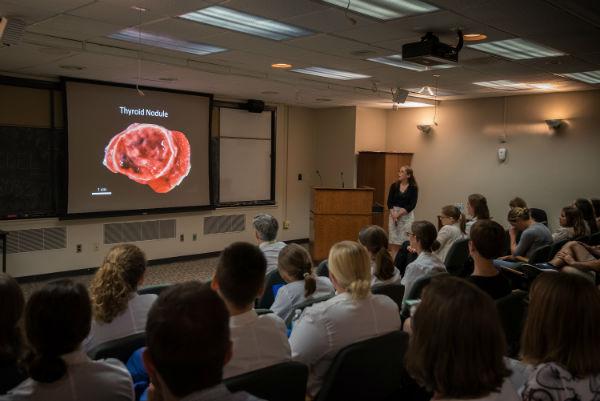The annual application cycle is July 1-Jan. 15. Materials must be submitted by Jan. 15th to be presented for review by the Admissions Committee. The minimum shadowing requirement is ten hours in surgical and autopsy pathology laboratories. Click the FAQ link for application details and process.
Applicants will undergo the application process through our applicant portal. Details about the program application process, as well as instructions pertinent to the application are provided in the portal.
A review committee consisting of the Program Director, staff pathologists’ assistants, residents and other course coordinators will approve all final admissions decisions. Criteria for admission are weighted to academic preparation and performance
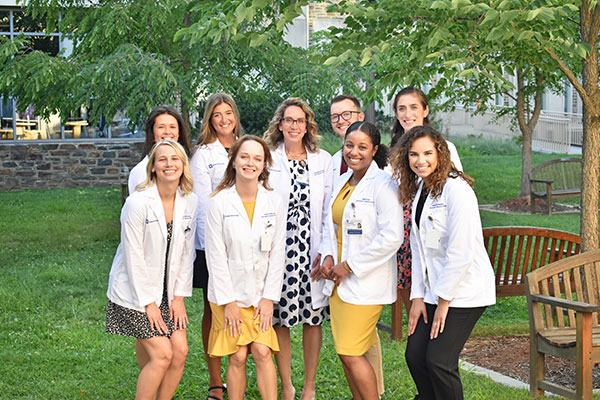
Prerequisites (updated 03-29-2024)
- A baccalaureate degree in a biological or chemical science from an accredited institution which includes course work in general biology (two semesters), general chemistry (two semesters), organic chemistry (at least one semester), biochemistry, and college mathematics (at least to the level of algebra).
-or-
A baccalaureate degree in a non-science major to include college mathematics (at least to the level of algebra) as well as at least 24 credit hours including the science courses listed above as well as any additional courses chosen to expand the scientific knowledge creating a background to successfully begin the study of medical sciences. Recommended additional courses to consider include: Anatomy, Cell Biology, Genetics, Histology/Microscopic Anatomy, Immunology, Microbiology, Molecular Pathology, Physiology. - Scores for the Graduate Record Examination taken within the past five years are required for all applicants regardless of prior education or experience. The MCAT is not accepted in lieu of the GRE. Candidates who receive their baccalaureate degree from institutions outside the United States must submit a transcript evaluation showing degree equivalency and course by course subject matter description, and must submit either TOEFL or IELTS scores (no more than 2 years old) if English is not their native language.
- A minimum of 10 hours shadowing in anatomic pathology, specifically surgical pathology (preferably in more than one setting), or surgical pathology laboratory work experience is required. Autopsy shadowing is also preferred, but not mandatory.
- All candidates for the Master of Health Science degree and certification as Pathologists’ Assistants must possess the physical and mental skills and abilities necessary to successfully complete the training program curriculum. To achieve the optimal educational experience, students are required to participate in all phases of the training program, in compliance with the following Technical Standards.
The study of medicine is not a pure intellectual exercise. Rather, a specific set of minimal physical, mental, emotional and social abilities are needed to be a successful student. Students must possess all of the abilities listed in the five Technical Standards categories below. The use of an intermediary that would, in effect, require a student to rely on someone else’s power of observation and/or communication will not be permitted.
I. OBSERVATION
- Visually observe materials presented in the learning environment including audiovisual presentations, written documents, microbiology cultures, microscopic examination of microorganisms, tissues and gross organs in the normal and pathologic state, and diagnostic images;
- Observe specimens accurately and completely, both at a distance and directly. This requires functional vision, hearing, and sensation.
II. COMMUNICATION
- Effectively speak, write, hear, read and use a keyboard utilizing the English language;
- Perceive non-verbal communications, including facial expressions, body language, and affect;
- Communicate effectively and sensitively with patients and their families via speech as well as reading/writing;
- Communicate in oral and written form with the healthcare team in an effective, accurate, and efficient manner.
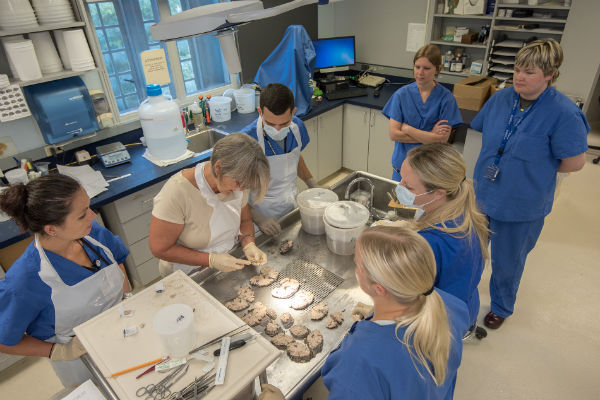
III. MOTOR
- Elicit information from surgical specimens and postmortem examinations by palpation and use of dissection instruments;
- Execute movements reasonably required to provide optimal gross analysis of surgical specimens and postmortem examinations. These skills require coordination of gross and fine motor movements, equilibrium, and sensation;
- Manipulate equipment and instruments to perform basic dissection procedures as required to attain curricular goals. (e.g., scalpel, forceps, scissors, needles and syringes, large dissection knife, band saw, camera).
IV. INTELLECTUAL/CONCEPTUAL, INTEGRATIVE, AND QUANTITATIVE ABILITIES
- Perform calculations necessary to solve quantitative problems as required by the curriculum;
- Collect, organize, prioritize, analyze and assimilate large amounts of technically detailed and complex information in a timely fashion. This information will be presented in a variety of educational settings, including lectures, small group discussions, and individual clinical settings. The applicant should be able to analyze, integrate, and apply this information appropriately for problem solving and decision-making;
- Apply knowledge and reasoning to solve problems as outlined by the curriculum;
- Comprehend the three dimensional spatial relationships of structures;
- Remain awake and alert.
V. BEHAVIORAL, EMOTIONAL AND SOCIAL ATTRIBUTES
- Possess the emotional health to fully apply their intellectual skill, exercise good judgment, and to complete all responsibilities attendant to the diagnosis and care of surgical specimens and postmortem examinations;
- Develop a mature, sensitive, and effective relationship with patients and colleagues;
- Tolerate the physical, mental and emotional stress experienced during training and patient care;
- Possess qualities of adaptability, flexibility, and the ability to function in the face of uncertainty;
- Form a compassionate relationship with patients while maintaining appropriate boundaries for a professional relationship;
- Behave in an ethical and moral manner consistent with professional values and standards;
- Exhibit sufficient interpersonal skills, knowledge, and attitudes to interact positively and sensitively with people from all parts of society, ethnic backgrounds, and belief systems;
- Cooperate with others and work collaboratively as a team.
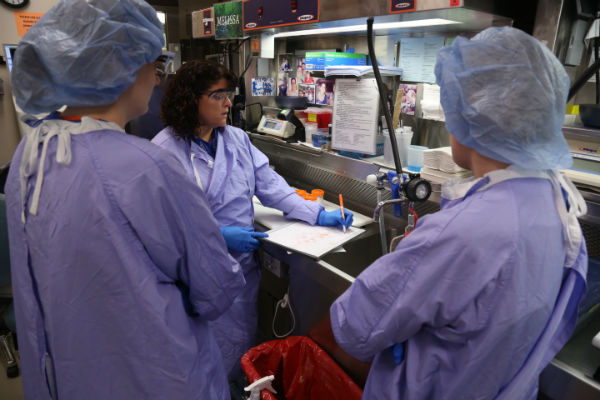
The faculty of the Duke University School of Medicine’s Pathologists’ Assistant Program recognizes its responsibility to present candidates for the MHS degree and certification that have the knowledge, attitudes, and skills to function in the specialized setting of anatomic pathology.
The Admissions Committee is responsible for adhering to these technical standards during the selection of students for the Pathologists’ Assistant Program.
Tuition
Tuition for the entering class in 2025 is $31,226 per year with yearly technology, insurance, and additional fees of approximately $8,500. The entering tuition and technology fee costs are guaranteed for the second year and will not increase. For a complete breakdown of the cost of attendance, please visit this site.
Financial Aid
Unsubsidized Stafford loans are available. Supplemental loans up to the program’s recommended budget are available from private lenders.
For more detailed information, contact:
Office of Financial Aid
Duke University School of Medicine
Box 3067 Duke University Medical Center
Durham, NC 27710
https://medschool.duke.edu/education/student-services/office-financial-aid
Class Size
The program accepts 6-8 students for each class.
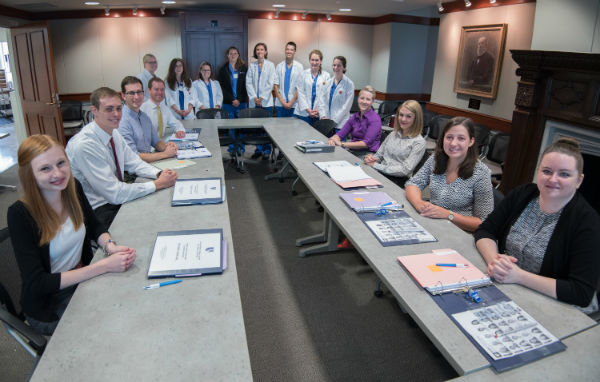
Duke University Nondiscrimination Statement
Duke is committed to encouraging and sustaining a learning and work community that is free from prohibited discrimination and harassment. Duke does not discriminate on the basis of age, color, disability, ethnicity, gender, gender identity, gender expression, genetic information, national origin, race, religion, sex (including pregnancy and pregnancy-related conditions), sexual orientation, or military status, in the administration of its educational policies, admission policies, financial aid, employment, or any other institution program or activity.
Duke has designated the Vice President for Institutional Equity and Chief Diversity Officer as the individual responsible for the coordination and administration of its nondiscrimination and harassment policies.
Questions or comments about harassment or discrimination can be directed to one of the following administrators in the Office for Institutional Equity:
Discrimination in Duke’s programs and activities:
Cynthia Clinton, AVP Harassment and Discrimination Prevention and Compliance
Title IX Coordinator
Office for Institutional Equity
114 S. Buchanan Blvd., Bay 8
Durham, NC 27708
919-684-8222
Sex discrimination in educational programs or activities:
Adrienne Allison, Deputy Title IX Coordinator for Students, Compliance Investigator
Office for Institutional Equity
114 S. Buchanan Blvd., Bay 8
Durham, NC 27708
919-684-8222
The complete text of Duke's Policy on Prohibited Discrimination, Harassment, and Related Misconduct and appropriate complaint procedures, may be found by visiting the Office for Institutional Equity's website
Additional information and resources are available through the U.S. Department of Education Office for Civil Rights website or by calling1-800-421-3481.
Annual Security and Fire Safety Reports
The Annual Security Report and Annual Fire Safety Report include institutional policies concerning campus safety and security, as well as statistics for the previous three years concerning reported crimes that occurred on Duke University property and on public property adjacent to campus and fires that have occurred in residence halls. A copy of these Reports can be obtained by contacting the Duke Police Department at 919-684-4602 or writing to 502 Oregon Street, Durham, N.C., 27708, or by accessing: https://police.duke.edu/news-stats/clery
